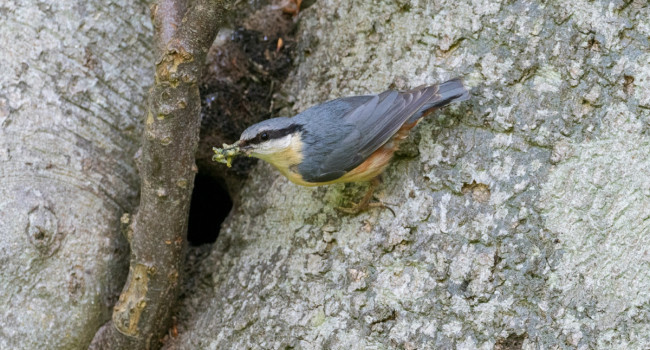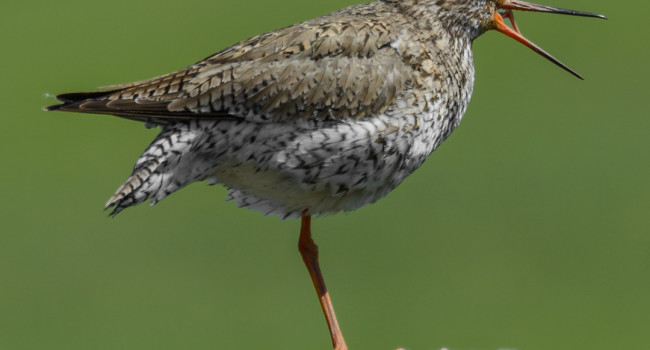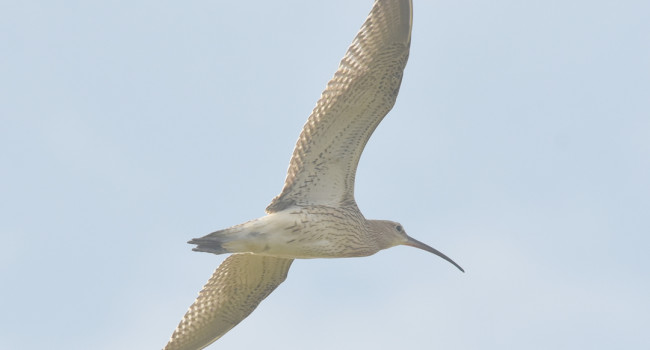Samantha Franks
Senior Research Ecologist
Samantha works on a range of projects examining the affect of climate and habitat change on bird populations, with a particular focus on migrants and waders.
Interests & Responsibilities
Sam's research interests focus on exploring how our changing environment is influencing bird populations, particularly for long-distance migrants and waders. She is particularly interested in investigating the ecological processes driving population change and linking these to changes in demographic processes such as survival and productivity. Sam is leading elements of the BTO's breeding wader research, with a particular focus on curlew, and is co-supervising a PhD project with University of East Anglia on the curlew population breeding in the Brecks. Her interest in waders dovetails with her love for upland and Arctic ecosystems and her years working on Alaskan-breeding shorebirds. Sam has used a range of methods, including stable isotypes, geolocators, satellite and GPS tags to track the movements and migratory connectivity of bird populations to investigate how birds interact with their environment throughout the annual cycle.
Previous and current projects include exploring the habitat use of BTO's satellite-tagged cuckoos during autumn migration, investigating the drivers of population declines in UK-breeding Curlew using Breeding Bird Survey data, examining how climate change might impact UK bird populations through changes in the timing of breeding and invertebrate availability in spring, and evaluating the effectiveness of conservation measures for European grassland waders.
Sam also represents BTO in the Cambridge Conservation Initiative's (CCI) David Attenborough Building as the Collaborative Coordinator. Her aims for this role are to develop and facilitate strategic collaborations for BTO within the CCI and wider conservation communities.
In her spare time, Sam is a ringer and photographer, and rings with the Wash Wader and Little Ouse Ringing Groups. She is keen to influence the next generation of wildlife conservationists, and endeavours to ensure her daughter knows the difference between a godwit and a curlew from a young age.
Other Information
Associate Editor for Wader Study
Qualifications
2012 - PhD, Simon Fraser University, Canada: Population connectivity and the causes and consequences of differential migration in a long distance migratory shorebird, the Western Sandpiper 2005 - BSc Honours Zoology, University of Toronto, Canada
Recent BTO Publications
Other Publications
Weiser, E.L., Lanctot, R.B., Brown, S.C., Gates, H.R., Bentzen, R.L., Boldenow, M.L., Cunningham, J.A., Doll, A.C., Donnelly, T.F., English, W.B., Franks, S.E., Grond, K., Herzog, P., Hill, B.L., Kendall, S.J., Kwon, E., Lank, D.B., Liebezeit, J.R., Rausch, J., Saalfeld, S.T., Taylor, A.R., Ward, D.H., Woodard, P.F. & Sandercock, B.K. 2018. Effects of leg flags on nest survival of four species of Arctic-breeding shorebirds. Journal of Field Ornithology 89: 287-297
Weiser, E.L., Lanctot, R.B., Brown, S.C., Bentzen, R.L., Bêty, J., Boldenow, M.L., English, W.B., Franks, S.E., Gates, H.R., Koloski, L., Kwon, E., Lamarre, J-.F., Lank, D.B., Liebezeit, J.R., McKinnon, L., Nol, E., Rausch, J., Saalfeld, S.T., Senner, N.R., Ward, D., Woodard, P.F. & Sandercock, B.K. 2017. Environmental and ecological conditions at Arctic breeding sites have limited effects on true survival rates of adult shorebirds. Auk 135: 29-43
Kwon, E., English, W.B., Weiser, E.L., Franks, S.E., Hodkinson, D.J., Lank, D.B. & Sandercock, B.K. 2017. Delayed egg-laying and shortened incubation duration of Arctic-breeding shorebirds coincide with climate cooling. Ecology and Evolution. https://doi.org/10.1002/ece3.3733
Reudink, M.W., Kyle, C.J., McKellar, A.E., Somers, C.M., Reudink, R.L.F., Kyser, T.K., Franks, S.E. & Nocera, J.J. 2016. Linking isotopes and panmixia: high within-colony variation in feather δ2H, δ13C, and δ15N across the range of the American White Pelican. PLOS ONE 11: e0150810
Franks, S.E., Fernández, G., Hodkinson, D.J., Kyser, T.K. & Lank, D.B. 2013. The long and the short of It: no dietary specialisation between male and female western sandpipers despite strong bill size dimorphism. PLoS ONE 8: e79835
Bugajski, A., Reudink, M.W., Doucette, J.L., Franks, S.E., Wissel, B. & Somers, C.M. 2013. The complexity of cormorants: stable isotopes reveal multiple prey sources and feeding site switching. Canadian Journal of Fisheries and Aquatic Sciences 70: 271–279
Franks, S.E, Norris, D.R., Kyser, T.K., Fernández, G., Schwarz, B., Carmona, R., Colwell, M.A., Sandoval, J.C., Dondua, A., Gates, H.R., Haase, B., Hodkinson, D.J., Jiménez, A., Lanctot, R.B., Ortego, B., Sandercock, B.K., Sanders, F., Takekawa, J.Y., Warnock, N., Ydenberg, R.C. & Lank, D.B. 2012. Range-wide patterns of migratory connectivity in the western sandpiper Calidris mauri. Journal of Avian Biology 43: 1-13
Franks, S.E., Lank, D.B., Norris, D.R., Sandercock, B.K., Taylor, C.M., & Kyser, T.K. 2009. Feather isotope analysis discriminates age-classes of western, least, and semipalmated sandpipers when plumage methods are unreliable. Journal of Field Ornithology 80: 51–63







Share this page